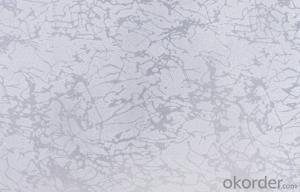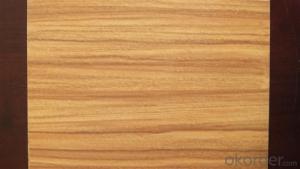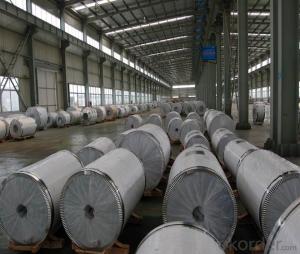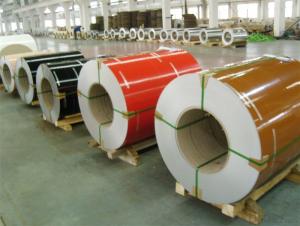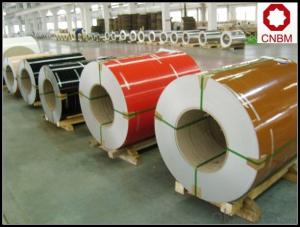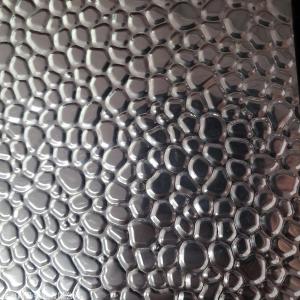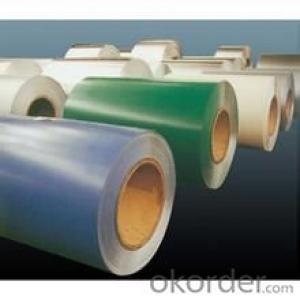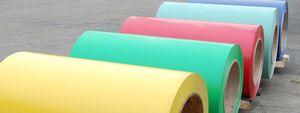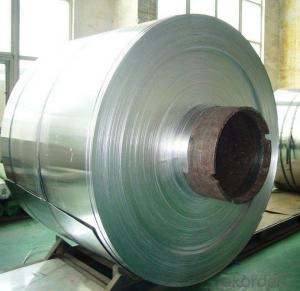Gpc1430h41 Coated Aluminum Coil
- Loading Port:
- China Main Port
- Payment Terms:
- TT OR LC
- Min Order Qty:
- -
- Supply Capability:
- -
OKorder Service Pledge
OKorder Financial Service
You Might Also Like
Product Description:
1 Specifications of PE Coated Aluminum Coil/Sheet
Alloy | AA1050,AA1060, AA1070, AA1100, AA3003, AA3004, AA3005, AA3105, AA5005, AA5052, AA5754, AA5083, AA8011 |
Temper: | H12, H14, H16, H18, H22, H24, H26, H32,HO, F |
Thickness: | 0.10-4.0mm |
Width: | 10mm- 2000mm |
Coating | PE(Polyester) |
Painting Thickness | Standard 16-25 microns, max 40 microns |
Color | Acording to Ral colors or customer’s samples |
Standard: | GB/T17748-1999, ASTM, ISO, EU standard |
Special Specification is available on customer’s requirement | |
Paint Material:PPGI,BECKER, NIPPON.
PE(polyester) Coating
PVDF
2 Usage/Applications of PE Coated Aluminum Coil/Sheet
Our company's PE Coated Aluminum Coil/Sheet have been widely used in the fields of construction and decoration(garage doors, ceiling etc.), electronic appliances, lighting decoration, air-condition air pipe, sanwich panels and drainage, etc.
- Q: How are aluminum coils cleaned and maintained?
- Aluminum coils are commonly used in HVAC systems and refrigeration units, and it is essential to clean and maintain them regularly to ensure optimal performance and efficiency. Here is a step-by-step guide on how to clean and maintain aluminum coils: 1. Safety first: Before starting any cleaning process, ensure that the power to the HVAC system or refrigeration unit is turned off to avoid any accidents. 2. Remove debris: Begin by removing any visible debris, such as leaves, dirt, or dust, from the aluminum coils. Use a soft brush or a vacuum cleaner with a brush attachment to gently remove the debris. 3. Spray cleaning solution: Prepare a cleaning solution by mixing a mild detergent or coil cleaner with water. Follow the instructions on the product label to achieve the correct dilution ratio. Transfer the solution into a spray bottle. 4. Apply the cleaning solution: Spray the cleaning solution onto the aluminum coils, ensuring that all areas are covered. Allow the solution to sit for a few minutes to loosen any dirt or grime. 5. Scrub the coils: Use a soft brush or a coil cleaning brush to scrub the aluminum coils gently. Be cautious not to apply excessive pressure, as it may damage the delicate fins on the coils. Focus on areas with stubborn dirt or buildup. 6. Rinse with water: After scrubbing, rinse the aluminum coils thoroughly with clean water. A hose or a pressure washer on a low setting can be used to ensure all the cleaning solution and dirt are removed. Ensure that the water flows in the opposite direction of the airflow to avoid pushing debris further into the coils. 7. Check for any damage: While cleaning, inspect the aluminum coils for any signs of damage, such as bent fins or leaks. If any issues are found, it is recommended to contact a professional technician for repairs. 8. Allow to dry completely: After rinsing, allow the aluminum coils to air dry completely before turning the power back on. This will prevent any moisture-related issues and ensure the coils are ready for use. 9. Maintain a regular cleaning schedule: To keep the aluminum coils in excellent condition, it is crucial to establish a regular cleaning schedule. Depending on the usage and environmental factors, cleaning every three to six months is generally recommended. However, if the coils are installed in a highly polluted or dusty area, more frequent cleaning may be required. By following these steps and maintaining a regular cleaning schedule, you can ensure that your aluminum coils remain clean, efficient, and in optimal working condition.
- Q: What are the potential applications of coil-anodized aluminum coils?
- Coil-anodized aluminum coils possess unique properties and advantages, allowing them to be employed in a wide range of potential applications. Here are some of the primary areas where they can be utilized: 1. Architectural: The distinct properties of coil-anodized aluminum make it well-suited for architectural purposes, including cladding, roofing, and facades. With its anodized coating, it offers increased durability, resistance to weather conditions, and color stability, making it suitable for outdoor use in various climates. Furthermore, the coils can be shaped and formed to create different architectural elements, providing design flexibility. 2. Transportation: Due to its lightweight nature, coil-anodized aluminum is ideal for transportation applications. It can be employed in the manufacturing of parts and components for the automotive, aerospace, and marine industries. The anodized coating enhances its corrosion resistance, making it suitable for exterior components and structures. 3. Electronics: Coil-anodized aluminum coils find utility in the field of electronics manufacturing. The anodized coating provides excellent electrical insulation, which is crucial in applications necessitating high conductivity and insulation. It can be utilized in the production of components such as heat sinks, casings, and connectors. 4. Signage and displays: The vibrant and long-lasting colors achieved through coil-anodizing make it a perfect material for signage and displays. The anodized coating ensures color stability against UV radiation and harsh weather conditions, rendering it suitable for both indoor and outdoor applications. It enables the creation of eye-catching and durable signage and displays. 5. Furniture and interior design: Coil-anodized aluminum coils can be employed in the manufacture of furniture and interior design elements. The anodized coating provides a smooth, durable, and scratch-resistant surface, making it suitable for applications like tables, chairs, wall panels, and decorative elements. The wide range of available colors and finishes allows for versatile design possibilities. 6. Industrial applications: Coil-anodized aluminum coils can be utilized in diverse industrial sectors. The anodized coating offers enhanced corrosion resistance, which is advantageous in industries such as chemical processing, food processing, and pharmaceuticals. It can be used in the production of tanks, containers, and equipment that require resistance against harsh chemicals and environments. 7. Energy and sustainable applications: The lightweight nature and durability of coil-anodized aluminum make it suitable for energy and sustainable applications. It can be employed in the manufacturing of solar panels, heat exchangers, and other energy-related components. The anodized coating provides protection against weathering and corrosion, ensuring long-term performance. In conclusion, coil-anodized aluminum coils have extensive and diverse potential applications, spanning across architectural, transportation, electronics, signage, furniture, industrial, and energy sectors. The combination of its lightweight nature, durability, color stability, and corrosion resistance makes it a versatile material for various industries and applications.
- Q: How to calculate the wall thickness with the gross weight of aluminum coil known?
- Gross weight*density=volume volume÷(aluminum sheet *width)=thickness
- Q: What precautions should be taken to ensure the safe and efficient transportation of aluminum coils?
- <p>The best way to handle aluminum coil during transportation involves using proper lifting equipment, ensuring secure strapping, and maintaining a stable and dry environment. Use slings or lifting beams specifically designed for metal coils to prevent damage. Ensure the coil is strapped tightly to prevent shifting during transit. Keep the coils covered to protect from moisture and dirt. Always follow the manufacturer's guidelines for weight limits and handling procedures.</p>
- Q: What are the different coil cutting options available for aluminum coils?
- There are several coil cutting options available for aluminum coils, depending on the specific requirements and applications. Some of the common coil cutting options include: 1. Slitting: Slitting is the most common coil cutting method used to cut aluminum coils into narrower widths. It involves passing the coil through a set of circular knives that slit the coil into multiple narrower coils of desired widths. Slitting is ideal for creating narrower strips for various applications such as automotive parts, construction materials, and electrical components. 2. Shearing: Shearing is another coil cutting option where a straight-line cut is made along the length of the coil using a shear blade. It is typically used when there is a need to cut the coil to a specific length, without altering the width. Shearing is commonly used in industries such as packaging, construction, and HVAC for making precise cuts. 3. Cut-to-Length: Cut-to-length cutting option involves cutting aluminum coils into specific lengths as per customer requirements. This method is often used when the coil needs to be transformed into individual sheets or plates of a particular size. Cut-to-length is widely utilized in the manufacturing of signage, roofing, and general sheet metal applications. 4. Stamping: Stamping is a coil cutting method that uses a die and a punch to cut aluminum coils into various shapes. This technique is suitable for creating intricate shapes or patterns in the coil material. Stamped aluminum coils are commonly used in industries like automotive, aerospace, and electronics for manufacturing specialized components. 5. Laser Cutting: Laser cutting is a precise and efficient method that utilizes a high-powered laser to cut through aluminum coils. This technology is suitable for cutting complex shapes and patterns with high accuracy. Laser cutting is often utilized in industries like automotive, electronics, and architectural applications. These are some of the commonly used coil cutting options for aluminum coils. The choice of method depends on factors such as required dimensions, tolerances, shape complexity, and the desired end-use application.
- Q: Is it possible to use aluminum coil for creating a sculpture?
- <p>Yes, you can use aluminum coil to make a sculpture. Aluminum is a versatile material known for its strength, lightweight, and malleability, which makes it suitable for sculpting. It can be bent, twisted, and shaped into various forms. When working with aluminum coil, you can use tools like pliers, wire cutters, and a metal bender to manipulate the coil into the desired sculpture shape. Ensure you take safety precautions, such as wearing gloves and eye protection, due to the sharp edges and the risk of injury from handling metal.</p>
- Q: The user is asking if it's possible to create furniture using aluminum coils.
- <p>Yes, you can use aluminum coils to make your own furniture. Aluminum is a versatile material known for its strength, durability, and lightweight properties, making it suitable for furniture construction. You can bend and shape aluminum coils to create unique designs for chairs, tables, or shelving. However, it's essential to have the right tools and skills for cutting, bending, and joining the coils. Ensure you follow safety precautions when working with metal, and consider the structural integrity and weight distribution of your design to ensure the furniture's stability and longevity.</p>
- Q: What are the different thicknesses available for aluminum coils?
- To meet different application needs, aluminum coils come in various thicknesses. The available options typically span from 0.2mm to 6mm. The thickness required depends on the intended use of the coil. For applications that prioritize flexibility and lightweight properties, thinner coils ranging from 0.2mm to 1mm are commonly used in electronics, packaging, and building materials. Medium thickness coils, ranging from 1mm to 3mm, find frequent use in automotive parts, roofing, and cladding applications. Conversely, heavier-duty industrial applications like shipbuilding, aerospace, and construction utilize thicker aluminum coils, measuring 3mm to 6mm in thickness. To determine the most suitable thickness for a given application, it is crucial to consider the specific requirements and intended use of the aluminum coil.
- Q: This question seeks advice on methods to prevent rust formation on aluminum coils.
- <p>To prevent rust on aluminum coil, ensure proper storage conditions by keeping the coils dry and avoiding contact with moisture. Use protective coatings or sealants that are compatible with aluminum to create a barrier against the elements. Regularly inspect the coils for signs of corrosion and clean them with a non-abrasive cleaner to remove any contaminants. Avoid using harsh chemicals that could accelerate oxidation. Maintain good ventilation in storage areas to reduce humidity, which can contribute to rust formation. Finally, consider using anodizing or other surface treatments that enhance the aluminum's natural resistance to corrosion.</p>
- Q: Is it possible to utilize aluminum coil as a conductor for speaker wires?
- <p>While it is technically possible to use aluminum coil as speaker wire, it is not recommended. Aluminum has higher resistance and lower conductivity compared to copper, which is the standard material for speaker wires. This can result in signal loss and reduced sound quality. Copper is preferred due to its superior electrical conductivity, ensuring minimal signal degradation over distance. For optimal audio performance, it's best to use speaker wire made from high-quality copper or copper-clad aluminum.</p>
Send your message to us
Gpc1430h41 Coated Aluminum Coil
- Loading Port:
- China Main Port
- Payment Terms:
- TT OR LC
- Min Order Qty:
- -
- Supply Capability:
- -
OKorder Service Pledge
OKorder Financial Service
Similar products
Hot products
Hot Searches
Related keywords
